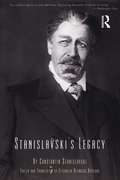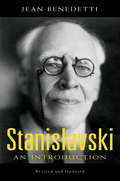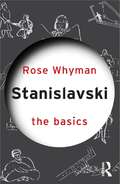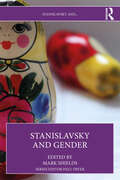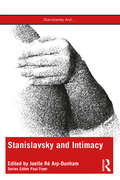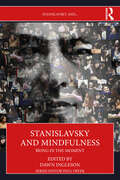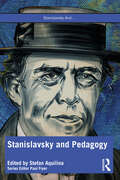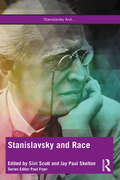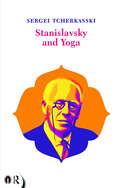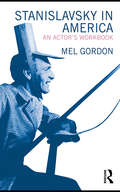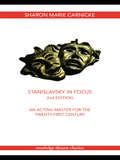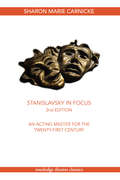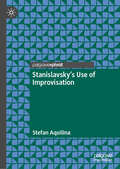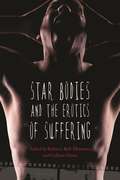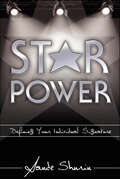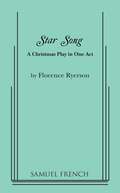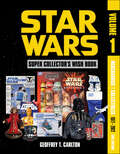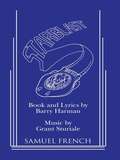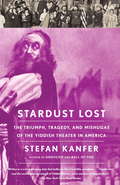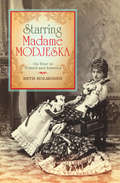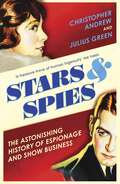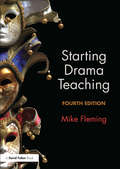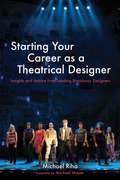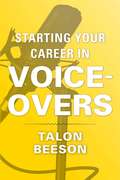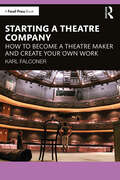- Table View
- List View
Stanislavski's Legacy: A Collection Of Comments On A Variety Of Aspects Of An Actor's Art And Life
by Constantin StanislavskiFirst Published in 1987. Routledge is an imprint of Taylor & Francis, an informa company.
Stanislavski: An Introduction, Revised and Updated (Performance Bks.)
by Jean BenedettiJean Benedetti's Stanislavski is the clearest and most succinct explanation of Stanislavski's writings and ideas, especially those in the Stanislavski's acting trilogy – An Actor Prepares, Building a Character, and Creating a Role – a staple of every actor's library. Now available in an attractive new edition, Stanislavski: An Introduction provides the perfect guide through the Master's writing.
Stanislavski: The Basics (The Basics)
by Rose WhymanStanislavski: The Basics is an engaging introduction to the life, thought and impact of Konstantin Stanislavski. Regarded by many as a great innovator of twentieth century theatre, this book examines Stanislavski's: life and the context of his writings major works in English translation ideas in practical contexts impact on modern theatre With further reading throughout, a glossary of terms and a comprehensive chronology, this text makes the ideas and theories of Stanislavski available to an undergraduate audience.
Stanislavsky and Gender (Stanislavsky And...)
by Mark ShieldsStanislavsky and Gender explores the intimate and complicated relationship between the enduring influence of Konstantin Stanislavsky and the evolving phenomenon of gender. This book provides new insights through historical research, unpublished and newly translated materials, and contemporary perspectives from diverse scholars and practitioners.Readers will gain a nuanced understanding of how gender informs and intersects with the legacy of Konstantin Stanislavsky and its related traditions from historical, feminist, pedagogical, intersectional, and queer contexts. Stanislavsky and Gender combines historical and contemporary perspectives from scholars and practitioners from the UK, Ireland, the US, Australia, Russia, and Brazil. Their contributions cover theatre histories, her-stories, emotion, feminism, pedagogy, intersectionality, race, and queerness. Following each chapter, contributors are joined in conversation to discuss their writing in a broader context.Part of the "Stanislavsky And…" series, Stanislavsky and Gender will be invaluable to scholars, teachers, students, and practitioners interested in integrating perspectives on gender into their research, teaching, and practice of Stanislavsky's legacy and associated traditions, and theatre history, acting, directing, actor training, and pedagogy more broadly.
Stanislavsky and Intimacy (Stanislavsky And...)
by Arp-Dunham, Joelle RéStanislavsky and Intimacy is the first academic edited book with a focus on how intimacy protocols, choreography, and theories intersect with the broad practices of Konstantin Stanislavsky’s ‘system’. As the basis for most Western theatre and film acting, Stanislavsky’s system centers on truthful performances. Intimacy direction and choreography insists on not only a culture of consent, but also specific, repeatable choreography for all staged intimate moments. These two practices have often been placed as diametric opposites, but this book seeks to dispel this argument. Each chapter discusses specific Stanislavskian principles and practices as they relate to staged sexually intimate moments, also opening the conversation to the broader themes and practices of other kinds of intimacy within the acting field. Stanislavsky And... is a series of multi-perspectival collections that bring the enduring legacy of Stanislavskian actor training into the spotlight of contemporary performance culture, making them ideal for students, teachers, and scholars of acting, actor training, and directing.
Stanislavsky and Mindfulness: Being in the Moment (Stanislavsky And...)
by Dawn InglesonStanislavsky and Mindfulness synthesises the two disciplines of acting and mindfulness focusing on elemental concepts from Stanislavsky’s System. Following mindfulness from East to West, this collection explores how Stanislavsky used techniques of mindfulness to create a way for actors to portray truthful characters.Using elements of neuroscience and wellbeing, Ingleson and her team of diverse authors share how mindfulness creates more believable and affective acting from a modern perspective. They discuss active, engaged performance and self-care and share workshop and rehearsal exercises that readers can take away and use in their own practice. British, American, African, European and Asian heritage voices come together to explore an inclusive and kind theatre-making and share new approaches to life in the industry and actor training. The contributors to this book, introduced by a foreword from Professor, director and author Anne Bogart, comprise theatre professors, directors and actors, Buddhists, Yoginis, academics, arts psychotherapists and mindfulness teachers.Part of the "Stanislavsky And…" series, Stanislavsky and Mindfulness is an accessible resource for theatre students, drama teachers and academics and readers with an interest in acting and how to apply mindfulness to different areas of our lives.
Stanislavsky and Pedagogy (Stanislavsky And...)
by Stefan AquilinaStanislavsky and Pedagogy explores current thinking around the pedagogical implications of Stanislavsky’s work. The volume depicts the voices of a number of practitioners, teachers, and scholars who are themselves journeying with Stanislavsky, and who in his work find a potent instigator for their own pedagogical practice and study. This book outlines instances in which updated interpretations of Stanislavsky’s pedagogy are adapted to cater for contemporary needs and scenarios. These include the theatre industry, new digital technologies, the need to develop playfulness, application to a broad repertoire, performance as pedagogy, university managerialism, and interdisciplinary crossovers with dance and opera. The pedagogies that emerge from these case-studies are marked by fluidity and non-fixity and help to underscore the malleability of Stanislavsky’s system. Stanislavsky And... is a series of multi-perspectival collections that bring the enduring legacy of Stanislavskian actor training into the spotlight of contemporary performance culture, making them ideal for students, teachers, and scholars of acting, actor training, and directing.
Stanislavsky and Race: Questioning the “System” in the 21st Century (Stanislavsky And...)
by Siiri Scott Paul SkeltonStanislavsky and Race is the first book to explore the role that Konstantin Stanislavsky’s “system” and its legacies can play in building, troubling and illuminating today’s anti-racist theatre practices. This collection of essays from leading figures in the field of actor training stands not only as a resource for a new area of academic enquiry, but also for students, actors, directors, teachers and academics who are engaged in making inclusive contemporary theatre. In seeking to dismantle the dogma that surrounds much actor training and replace it with a culturally competent approach that will benefit our entire community, the “system” is approached from a range of perspectives featuring the research, reflections and provocations of 20 different international artists interrogating Stanislavsky’s approach through the lens of race, place and identity. Stanislavsky and … is a series of multi-perspectival collections that bring the enduring legacy of Stanislavskian actor training into the spotlight of contemporary performance culture, making them ideal for students, teachers and scholars of acting, actor training and directing.
Stanislavsky and Yoga (Routledge Icarus)
by Sergei TcherkasskiThis book deals with one of the most important sources of the Stanislavsky System - Yoga, its practice and philosophy. Sergei Tcherkasski carefully collects records on Yoga in Stanislavsky's writings from different periods and discusses hidden references which are not explained by Stanislavsky himself due to the censorship in his day. Vivid examples of Yoga based training from the rehearsal practice of the Moscow Art Theatre and many of Stanislavsky's studios (the First Studio in 1910s, the Second Studio and Opera Studio of the Bolshoi Theatre in 1920s, Opera-Dramatic Studio in 1930s) are provided. The focus of Tcherkasski's research consists of a comparative reading of the Stanislavsky System and Yogi Ramacharaka's books, which were a main source for Stanislavsky. Accordingly, Tcherkasski analyzes elements of the System based on Yoga principles. Among them are: relaxation of muscles (muscular release), communication and prana, emission of rays and reception of rays, beaming of aura, sending of prana, attention, visualizations (mental images). Special attention is paid to the idea of the superconscious in Yoga, and in Ramacharaka's and Stanislavsky's theories. Tcherkasski's wide-ranging analysis has resulted in new and intriguing discoveries about the Russian master. Furthermore, he reveals the extent to which Stanislavsky anticipated modern discoveries in neurobiology and cognitive science. In this book Tcherkasski acts as a researcher, historian, theatre director, and experienced acting teacher. He argues that some forty per cent of basic exercises in any Stanislavsky based actor training program of today are rooted in Yoga. Actors, teachers, and students will find it interesting to discover that they are following in the footsteps of Yoga in their everyday Stanislavsky based training and rehearsals.
Stanislavsky in America: An Actor's Workbook
by Mel GordonStanislavsky in America explores the extraordinary legacy that Constantin Stanislavski’s system of actor-training has left on acting in the US. Mel Gordon outlines the journey of Stanislavski’s theories through twentieth century American history, from the early US tours of the Moscow Art Theatre to the ongoing impact of 'The System' on modern American acting. This fascinating study by a leading theatre critic and practitioner provides hundreds of original acting exercises, used by the pivotal US figures who developed his teachings, such as Lee Strasberg, Stella Adler and Bobby Lewis. By going back to these primary sources, Gordon cuts through the myths and misapprehensions which have built up over time. Part memoir and part practical guide, Stanislavsky in America is an essential resource for anyone wanting to understand Stanislavski’s work and his relationship with American theatre.
Stanislavsky in Focus: An Acting Master for the Twenty-First Century
by Sharon Marie CarnickeFirst published in 1998. Routledge is an imprint of Taylor & Francis, an informa company.
Stanislavsky in Focus: An Acting Master for the Twenty-First Century
by Sharon Marie CarnickeStanislavsky in Focus brilliantly examines the history and actual premises of Stanislavsky’s 'System', separating myth from fact with forensic skill. The first edition of this now classic study showed conclusively how the 'System' was gradually transformed into the Method, popularised in the 1950s by Lee Strasberg and the Actor’s Studio. It looked at the gap between the original Russian texts and what most English-speaking practitioners still imagine to be Stanislavsky’s ideas. This thoroughly revised new edition also delves even deeper into: the mythical depiction of Stanislavsky as a tyrannical director and teacher yoga, the mind-body-spirit continuum and its role in the ‘System’ how Stanislavsky used subtexts to hide many of his ideas from Soviet censors. The text has been updated to address all of the relevant scholarship, particularly in Russia, since the first edition was published. It also features an expanded glossary on the System's terminology and its historical exercises, as well as more on the political context of Stanislavsky's work, its links with cognitive science, and the System's relation to contemporary developments in actor-training. It will be a vital part of every practitioner's and historian's library.
Stanislavsky’s Use of Improvisation
by Stefan AquilinaStanislavsky&’s Use of Improvisation is the first work that brings together material across Stanislavsky&’s entire career to survey his use of improvisation. Improvisation was a key concern for Stanislavsky, one that impinged on his acting, directing, and pedagogical work. Consequently, it features in many books on the System, but this study is unique because it focuses explicitly on improvisation and its place in Stanislavsky&’s development as a theatre-maker. This allows the reader to see how Stanislavsky treated improvisation as a highly mutable practice that was not bound to one particular interpretation, definition, or application. Improvisation will always relate to the present moment in an actor&’s work, to the here and now; it values aliveness and an engagement with the role. Beyond that, however, Stanislavsky&’s use of improvisation was a dynamic and expanded one that answered a range of work challenges.
Star Bodies and the Erotics of Suffering (Contemporary Approaches to Film and Media Series)
by And Colleen Glenn Rebecca Bell-MetereauSuffering in cinema can be crucial to how stars are cast in roles and perceived by audiences, whether it is performed on the screen or weathered in the form of scandal, heartbreak, disfiguration, or aging in an actor's real life. In Star Bodies and the Erotics of Suffering, editors Rebecca Bell-Metereau and Colleen Glenn assemble thirteen scholars to consider fourteen stars whose careers have been defined by suffering on- or off-screen. Together, these essays question assumptions that an actor's ability to project an enduring image--both symbolic and physical--is necessary for box-office success, demonstrating instead that disruptions often shape and direct the star image. Contributors in this collection examine a wide range of stars from the last seventy years. Some essays deal with actors who have transformed temporarily for a role, or permanently, through aging or accident, such as Joaquin Phoenix, Daniel Day-Lewis, Mickey Rourke, Charlize Theron, and Hilary Swank. Other essays consider stars' attempts to conceal aspects of themselves from the public in order to maintain a palatable public image, including Rita Hayworth, Rock Hudson, and Michael Jackson. Some explore typecasting and audience expectations, noting how struggles with marriage, divorce, and aging intersect in the images of Natalie Wood, Marilyn Monroe, and Harrison Ford. A final set considers Sissy Spacek, Julia Roberts, and Halle Berry as women who reconfigure negative press and restrictive gender and racial expectations to their advantage, managing public perceptions of suffering in ways that flummox their critics. Star Bodies and the Erotics of Suffering offers film buffs, students, and scholars a fresh take on casting, method acting, audience reception, and the tensions at play in our fascination with an actor's dual role as private individual and cultural icon.
Star Power: Defining Your Individual Signature
by Sande ShurinSTAR POWER! establishes a new wave of Acting. It speaks to current and relevant issues that creative Actors are grappling with: How do I “BE” authentic and respond from my truth and still BE the character? How do I respond spontaneously and still fulfill the Director's vision? How do I bring my rich inner imaginative world out to be visible in the material world? What is the the“IT” factor? It’s STAR POWER! STAR POWER! engages the Actor in new possibilities, helping them develop their Authentic Self and define their Individual Signature. As an acting coach, it is Ms. Shurin’s job to transform good actors into “brilliant” ones. This is a book about Ms Shurin’s new discoveries on how to create an Individual Signature for the actor. The combination of “Individual Signature”, becoming that “brilliant actor” and having the the “commitment” to become a star is the missing link. Actors of all levels of experience will find interesting interviews from industry professionals and fellow Actors confirming these principles. STAR POWER! works. It is the future of acting. Ms. Shurin has recently found that these same principles benefit anyone in any profession: attorneys, doctors, salespeople, parents, teachers, students, politicians and more. She hopes these life-altering principles will be used for the betterment of humanity.
Star Song
by Florence RyersonChristmas Play / 4m, 5f / The scene is an inn on the way to Bethlehem on the night of Christ's birth. The inn's occupants are too busy with their squabbles and personal worries to sense the great, holy event occurring in a stable nearby. Only a slave and a little lame girl are prepared for this momentous occasion. It is a very dramatic, touching play. A good opportunity for singing clubs or choirs, but the music may be minimal if desired.
Star Wars Super Collector's Wish Book, Vol. 1: Merchandise / Collectibles, 1977-2012
by Geoffrey T. CarltonOver the past two decades the Star Wars Super Collector&’s Wish Book series has brought knowledge and joy to tens of thousands of collectors. This comprehensively updated second edition to volume 1 provides a thorough survey of the non-toy merchandise and collectibles produced from 1977 to 2012. Key Features: • 8,000 items from the pre-Disney era have been added to the first edition's nearly 12,000• Provides identification, price information, and over 15,000 images• Covers a full range of items, including books, art, trading cards, home decor, clothing and accessories, dishes, bedding, and special packaging for food, beverages, and personal care items An important addition to the bookshelf of every informed collector or Star Wars fan, this easy-to-use directory will introduce collectors to thousands of items to add to their wish lists.
Starblast
by Barry HarmanAll Groups / Musical / 3 m., 2 f. minimum (can be done with up to 25 m. and f.) / This colorful musical demonstrates the importance of imagination in a world overwhelmed by technology. A young star voyager named P T III crashes his spacecraft on a bleak and forbidding world ruled by the dreaded and unseen Starblasters. He has 60 minutes to depart or he must face the Starblasters in mortal combat. His desperate search for help leads him to a nervous space dragon, a floating Moon Valley girl, two vaudevillian computer robots, some teen space greasers and finally, the awesome Mother Space. Each offers him advice but no help. Time is up and P T III faces the Starblasters. He is victorious at first, but the Starblasters re generate over and over until Peter Trenton III wakes up clutching his new Starblasters video game. Would be astronaut Peter stares out at the stars and knows it is fun to dream.
Stardust Lost: The Triumph, Tragedy, and Mishugas of the Yiddish Theater in America
by Stefan KanferInStardust Lost, Stefan Kanfer brings the colorful Yiddish stage roaring back to life. Born of ancient traditions stretching back to the drama of the Old Testament, the Yiddish theater was a vibrant part of the immigrant experience. Kanfer invokes the energy, belief, and purechutzpahit took to establish and run the thriving, influential theaters. He reveals the nightly drama and comedy that played out behind the scenes as well as onstage, and introduces all the players--actors, divas, playwrights, directors, and producers--who made it possible. A richly evocative chronicle of its brief but dazzling existence in America, this is both an elegy for and a tribute to Yiddish theater--lost, but not forgotten.
Starring Madame Modjeska: On Tour in Poland and America
by Beth HolmgrenThe &“important . . . meticulously researched&” prize-winning biography of the pre-eminent Polish star of the nineteenth century global stage (CosmopolinReview.com). In reintroducing &“a little-remembered actress to a new American audience&” biographer Beth Holgram delivers a revelatory portrait of Helena Modjeska—from unparalleled European success to her reign as the most acclaimed, and most recognized female celebrity in the late nineteenth-century United States. In 1876, Poland&’s leading actress, Helena Modrzejewska, accompanied by her husband, the self-stylized Count Bozente, emigrated to southern California to give up her career and establish a utopian commune. In light of its failings, it hardly fulfilled the real dreams of Madame Helena. Within a year, she changed her surname to Modjeska, and made her American debut at San Francisco&’s California Theatre. Godmother to Ethel Barrymore, and sharing the Shakespearian stage with such luminaries as Otis Skinner, Edwin Booth, and Maurice Barrymore, Helena Modjeska became the leading star in the United States, where she reigned for the next thirty years. In this &“Impressive . . . achievement,&” Holmgren traces Modjeska&’s fabulous life and career from her illegitimate birth in Krakow, to her successive reinventions of herself as a trans-continental diva, and finally to her enduring legacy (Women&’s Review of Books). All in all, Starring Madame Modjeska &“makes for great drama&” (NewPages.com).
Stars and Spies: The story of Intelligence Operations…
by Christopher Andrew Julius GreenA vastly entertaining and unique history of the interaction between spying and showbiz, from the Elizabethan age to the Cold War and beyond.'A treasure trove of human ingenuity' The TimesWritten by two experts in their fields, Stars and Spies is the first history of the extraordinary connections between the intelligence services and show business.We travel back to the golden age of theatre and intelligence in the reign of Elizabeth I. We meet the writers, actors and entertainers drawn into espionage in the Restoration, the Ancien Régime and Civil War America. And we witness the entry of spying into mainstream popular culture throughout the twentieth century and beyond - from the adventures of James Bond to the thrillers of John le Carré and long-running TV series such as The Americans.'Thoroughly entertaining' Spectator'Perfect...read as you settle into James Bond on Christmas afternoon.' Daily Telegraph
Starting Drama Teaching
by Mike FlemingWhy teach drama? How can a newcomer teach drama successfully? How do we recognize quality in drama? Starting Drama Teaching is a comprehensive guide to the teaching of drama in schools. Exploring the aims and purposes of drama, it provides an insight into the theoretical perspectives that underpin practice alongside activities, example lesson plans and approaches to planning. Written in an accessible style, the book addresses such practical issues as setting up role play, how to inject depth into group drama, working with text, teaching playwriting, as well as common problems that arise in the drama classroom and how to avoid them. ?? This fourth edition has been updated to reflect the latest educational thinking and developments in policy and includes: a new chapter on researching drama; an extra section on digital technology and drama; guidance on different approaches to drama; advice on how teachers can achieve and recognize quality work in drama; a discussion of drama concepts including applied theatre, ensemble and rehearsal approaches. Acting on the growing interest in drama both as a separate subject and as a teaching methodology, this book is full of sensible, practical advice for teachers using drama at all levels and in all kinds of different school contexts. Written by an internationally recognized leading name in drama education, this book is valuable reading for trainee teachers who are new to drama and teachers who wish to update and broaden their range.
Starting Your Career as a Theatrical Designer: Insights and Advice from Leading Broadway Designers (Starting Your Career)
by Michael Mayer Michael J. RihaIn the first book of its kind to be published in twenty years, ten award-winning and current Broadway designers-five set designers, four lighting designers, and one projection designer-discuss the business aspects of the theatre world, sharing relevant insider information and strategies that will prove invaluable to aspiring and seasoned theatrical designers alike. Culled from years of experience, the information offered in these enlightening conversations will strengthen readers' understanding of how designing in the commercial theatre is different from designing in an academic setting or not-for-profit theatres. The conversations are accompanied by designer sketches, finished drawings, technical plates of drafting, photos of scale models, storyboards illustrating multi-scene productions and unique lighting looks, and photos from Broadway and regional theatre productions. If you've ever wondered what it really takes to make it in the world of theatre design, let these Broadway stars be your guide!
Starting Your Career in Voice-Overs (Starting Your Career)
by Talon BeesonVoice-over acting is no longer all about having that "announcer-y" boom or classic fireside radio voice. More and more casting directors are looking for regular, "conversational" voices to represent a product in a commercial or to play the animated moose in a new Hollywood flick, but the competition is fiercer now than ever before. In a business that is "more risk than reward, more heartbreak than success," author Talon Beeson will show you in Starting Your Career in Voice-Overs how to beat the odds, improve your skills, make the right connections, and build a career in the voice-over business. Some of the topics covered in this book include:Warm-up exercises for the voiceReading everything-jokes, telephone numbers, video games, commercials, feature films, and moreCold readsAnalyzing scenes and translating that analysis to voiceCreating demo tapesRepresenting and marketing yourself effectivelyEquipment and recording at homeAnd many more!This instructional book for professionals presents readers with varying techniques, exercises, and theories to practice-a vocational foundation guaranteed to elevate an actor's game. In an ingenious and instructive way, Beeson relates voice work to the greatest dramatist of all times, William Shakespeare. This is an added bonus for the classically inclined individual and provides excellent training for every actor. This intellectually informed book is designed improve your voice skills and teach you the basics of the business-the ultimate preparation for any serious actor seeking to pursue this field. Surrounded by microphones, voice-over actors are a unique breed who require additional and different skills to create their reality, and Talon Beeson shows you how to do just that in Starting Your Career in Voice-Overs.
Starting a Theatre Company: How to Become a Theatre Maker and Create Your Own Work
by Karl FalconerExploring everything from company incorporation and marketing, to legal, finance and festivals, Starting a Theatre Company is the complete guide to running a low-to-no budget or student theatre company. Written by an experienced theatre practitioner and featuring on-the-ground advice, this book covers all aspects of starting a theatre company with limited resources, including how to become a company, finding talent, defining a style, roles and responsibilities, building an audience, marketing, the logistics of a production, legalities, funding, and productions at festivals and beyond. The book also includes a chapter on being a sustainable company, and how to create a mindset that will lead to positive artistic creation. Each chapter contains a list of further resources, key terms and helpful tasks designed to support the reader through all of the steps necessary to thrive as a new organisation. An eResource page contains links to a wide range of industry created templates, guidance and interviews, making it even easier for you to get up and running as simply as possible. Starting a Theatre Company targets Theatre and Performance students interested in building their own theatre companies. This book will also be invaluable to independent producers and theatre makers.
